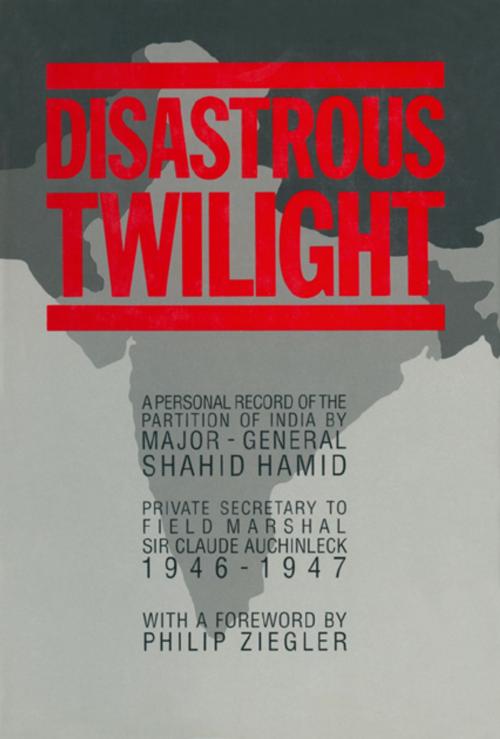Disastrous Twilight
A Personal Record of the Partition of india by Major-General Shahid Hamid
Nonfiction, History, Military, World War II| Author: | Shahid Amid | ISBN: | 9781473813670 |
| Publisher: | Pen and Sword | Publication: | September 13, 1993 |
| Imprint: | Leo Cooper | Language: | English |
| Author: | Shahid Amid |
| ISBN: | 9781473813670 |
| Publisher: | Pen and Sword |
| Publication: | September 13, 1993 |
| Imprint: | Leo Cooper |
| Language: | English |
The Partition of India in 1947 probably created more problems than it solved, problems which have bedevilled the subcontinent ever since and which show no sign of going away, since those who feel that they were hard done by at the time of the settlement nearly forty years ago harbour their grudges as fiercely as ever and clearly have no intention of accepting- their lot with equanimity in the foreseeable future. Any new assessment of the Partition is therefore doubly welcome - both as a contribution to history and as an aid to an understanding of what, in current jargon, is still very much an "on-going situation". General Hamid's book is of particular value in view of the unique vantage point from which it was written. In 1946 he was appointed Personal Secretary to Field-Marshal Sir Claude Auchinleck, then Commander-in-Chief, India. Realising that he had the good fortune to have been given a ringside seat for possibly the greatest of all the dramas in his country's history. Hamid decided to keep a diary which is only now being published because the author was made to promise that it would appear during the Auk's lifetime, a gesture typical of that very great and good but essentially private man. Hamid was in constant contact with all those people the sum of whose decisions were to lead to one of the greatest mass migrations, accompanied by one of the greatest mass migrations, accompanied by one of the greatest bloodbaths in the history of mankind. His observations on the build-up to this appalling tragedy have the added value of being untainted by hindsight, and though many may not agree with all his opinions, few will deny that the views he expressed at the time have stood up to the judgement of history remarkably well.
The Partition of India in 1947 probably created more problems than it solved, problems which have bedevilled the subcontinent ever since and which show no sign of going away, since those who feel that they were hard done by at the time of the settlement nearly forty years ago harbour their grudges as fiercely as ever and clearly have no intention of accepting- their lot with equanimity in the foreseeable future. Any new assessment of the Partition is therefore doubly welcome - both as a contribution to history and as an aid to an understanding of what, in current jargon, is still very much an "on-going situation". General Hamid's book is of particular value in view of the unique vantage point from which it was written. In 1946 he was appointed Personal Secretary to Field-Marshal Sir Claude Auchinleck, then Commander-in-Chief, India. Realising that he had the good fortune to have been given a ringside seat for possibly the greatest of all the dramas in his country's history. Hamid decided to keep a diary which is only now being published because the author was made to promise that it would appear during the Auk's lifetime, a gesture typical of that very great and good but essentially private man. Hamid was in constant contact with all those people the sum of whose decisions were to lead to one of the greatest mass migrations, accompanied by one of the greatest mass migrations, accompanied by one of the greatest bloodbaths in the history of mankind. His observations on the build-up to this appalling tragedy have the added value of being untainted by hindsight, and though many may not agree with all his opinions, few will deny that the views he expressed at the time have stood up to the judgement of history remarkably well.















